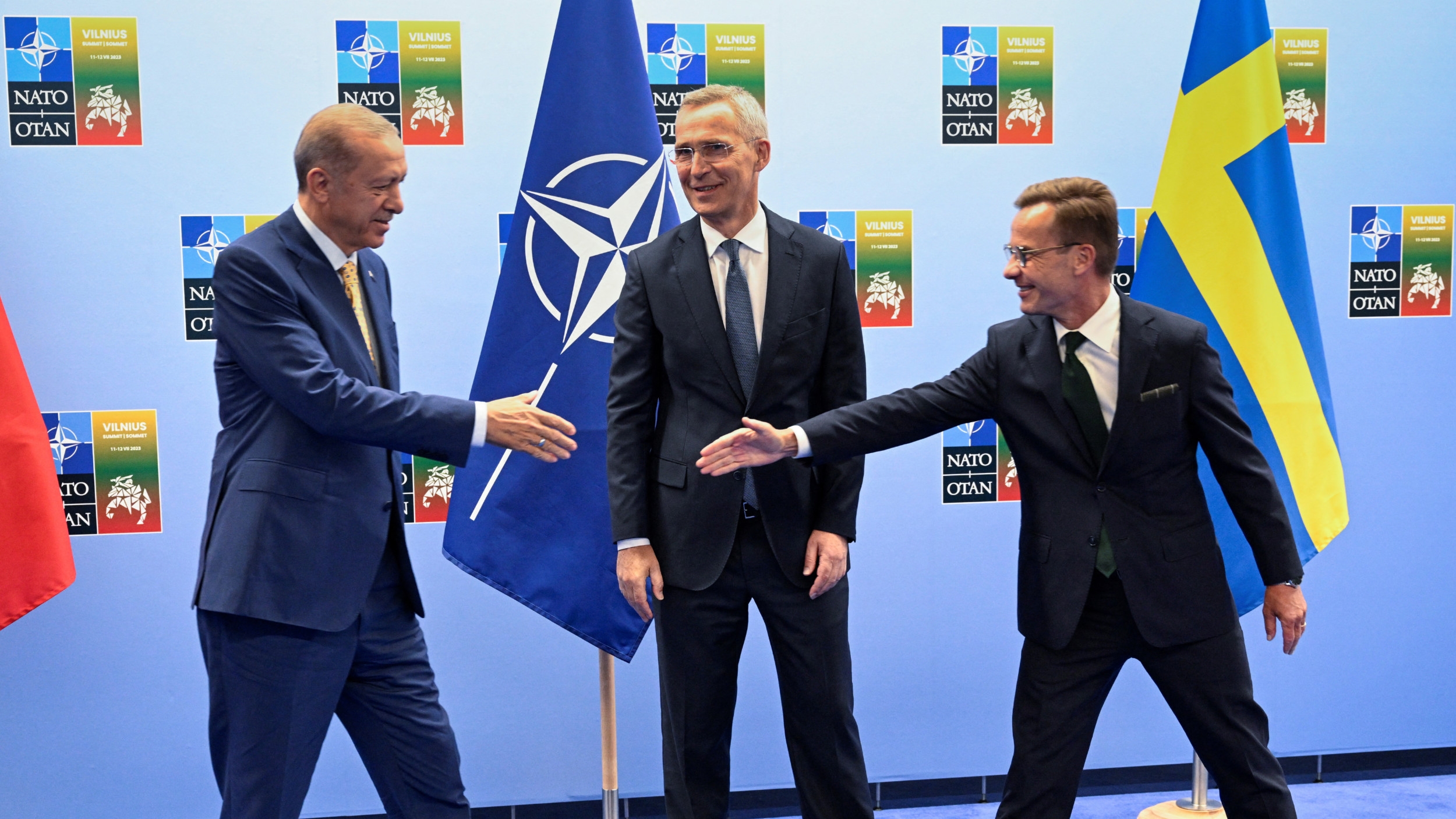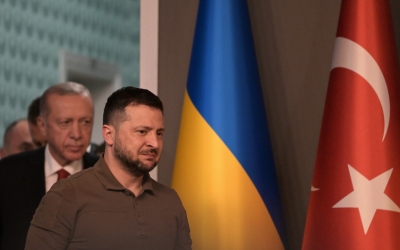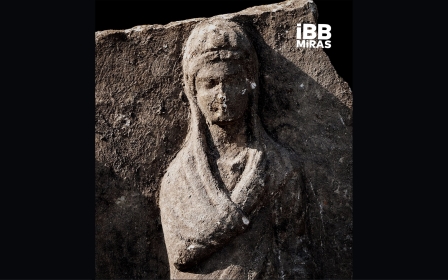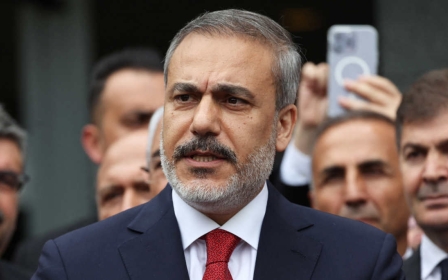Why is Erdogan linking Sweden’s Nato bid to Turkey’s EU membership?

Turkish President Recep Tayyip Erdogan opened a new lane of negotiations with his western allies on Monday, explicitly linking for the first time Sweden's Nato membership bid with Turkey's own longstanding bid for European Union membership.
Speaking on TV before departing for the Nato summit in Lithuania, Erdogan brought up the EU accession process, which has been stalled for many years for Turkey following deteriorating diplomatic relations between the country and its neighbours.
“First, open the way to Turkey's membership of the European Union, and then we will open [Nato membership] for Sweden, just as we had opened it for Finland," Erdogan said.
In a phone call with US President Joe Biden on Sunday, Erdogan also brought up the question of EU membership.
“Stating that Turkey is principled and honest about EU membership, President Erdogan said that Turkey wants to revive the EU membership process,” a Turkish presidency press release said.
New MEE newsletter: Jerusalem Dispatch
Sign up to get the latest insights and analysis on Israel-Palestine, alongside Turkey Unpacked and other MEE newsletters
“And that at the Vilnius summit, Ankara wanted the leading countries of the European Union and the EU leadership to give a clear and strong message of support for Turkey's membership.”
Last year, Turkey, Sweden and Finland signed a trilateral memorandum of understanding to satisfy a number of issues regarding terrorism and arms embargoes. The Scandinavian countries, long pillars of neutrality in the region, have pushed to join Nato in the wake of Russia's invasion of Ukraine.
Ankara earlier this year ratified Finland’s Nato membership but is still holding off on Sweden, citing the country's allowing demonstrations against Turkey and the repeated burning of the Quran by far-right activists.
In his phone call with Biden, Erdogan said Sweden had taken some steps in the right direction by making changes in anti-terrorism legislation, including bringing in prison terms of up to four years for individuals convicted of participating in an "extremist organisation" in a way that is intended to promote, strengthen or support the group.
However, Erdogan said, supporters of the Kurdistan Workers’ Party (PKK) continue to freely hold demonstrations in Stockholm, “which nullifies the steps taken”, according to the Turkish presidency statement.
A frozen process
Biden earlier this year tried to get Erdogan’s approval by linking the Sweden issue to Ankara’s multibillion-dollar worth of F-16 jet purchase requests from Washington.
On Sunday, Erdogan rebuffed it and said it was wrong to draw such links.
Turkey’s EU accession process is essentially frozen due to various roadblocks, such as controversy over the unification of Cyprus and negative views held of Erdogan in the West.
Ankara currently wants to update the customs union and achieve visa liberalisation - the latter recently has become a recurrent theme on Turkish social media because of apparently arbitrary visa denials by European countries.
But Erdogan’s request from Biden wasn’t spontaneous.
A person familiar with the issue told Middle East Eye that Turkish Foreign Minister Hakan Fidan also relayed the same request on EU accession during his phone call with US counterpart Antony Blinken over the weekend.
'More constructive and less confrontational language towards the West will be welcomed by the investors'
- Wolf Piccoli, analyst
The source said Biden, during the phone conversation, was pleasantly surprised by Erdogan’s comments on the revival of the EU process, saying that he was instrumental during the Bill Clinton administration on pushing the EU to accept Turkey as a member.
A spokesperson for the White House declined to comment.
Erdogan, a shrewd tactician, is known for broad strategic changes to his foreign policy after every election.
Erdogan maintained friendly relations with both Ukraine and Russia since last year, playing the mediator role, and negotiating a grain deal with the warring parties. He also maintained drone and weapons' sales to Kyiv while receiving Russian investors, tourists and a Moscow bailout for the flagging Turkish economy through a nuclear power plant.
But on Friday, Erdogan stated that he openly supported Ukraine’s Nato membership, something that could make Moscow angry, and signed another drone production deal with Kyiv.
Moreover, he decided to return some of the Ukrainian prisoners of war that were hosted by Ankara as part of a deal between Ukraine and Russia.
The Kremlin condemned Erdogan for releasing the officers, including two senior commanders of the so-called Azov regiment, who were declared heroes during the Mariupol defence, saying that Ankara violated the terms of a deal, which suggested Azov officers would stay in Turkey until the end of the conflict.
Unlikely to work
Some think Erdogan’s comments on Ukraine being in Nato are a smokescreen to ease pressure on himself regarding the Sweden veto.
But what are the reasons that might push Erdogan to make such a move on the EU front?
Turkey is currently suffering an economic crisis with soaring inflation and totally depleted foreign reserves.
Another source speculated that Erdogan might be thinking that Russian money isn’t enough to keep the ship afloat.
Erdogan, in an economic U-turn from his unorthodox monetary policy, last month appointed Mehmet Simsek, a former Wall Street banker who is the darling of the markets, as the minister of finance. Simsek hopes to reform the Turkish economy and shrink inflation, and both the budget and trade deficit.
But Ankara needs western investors to come back. Simsek’s first trips were to the UAE and Qatar to seek foreign direct investment, but there is a realisation in Ankara that this won't be enough either.
Between 2002-13, Erdogan anchored Turkey’s foreign policy and democratic credentials to the European Union, making reforms to grant more rights and freedoms to the Turkish public. Subsequent institutional reforms increased investor confidence in Turkey, resulting in billions of dollars of money flowing in the country.
But there is a strong chance that playing the EU card might not work now.
Wolf Piccoli, a long-term Turkey expert at consultancy firm Teneo, said Ankara doesn't appears to understand how the EU works.
“Of course, more constructive and less confrontational language towards the West will be welcomed by the investors,” Piccoli said. “But what Turkey does with Sweden’s Nato bid is an important sign.”
Piccoli said the US didn't have much leverage over the EU’s internal affairs, and didn’t have much in the past even at the height of the Clinton administration in the 90s.
“The climate in the EU capitals, such as Berlin and Paris, isn’t suitable to make meaningful progress in areas such as an update for [the] customs union and visa liberalisation. It is politically a no-go,” he said. “And the EU process isn’t something that investors look up to anymore."
Piccoli believes Erdogan might be deflecting blame on Sweden to the EU - and it isn’t likely to work.
Middle East Eye delivers independent and unrivalled coverage and analysis of the Middle East, North Africa and beyond. To learn more about republishing this content and the associated fees, please fill out this form. More about MEE can be found here.





